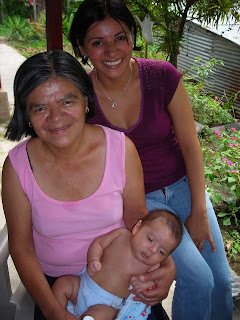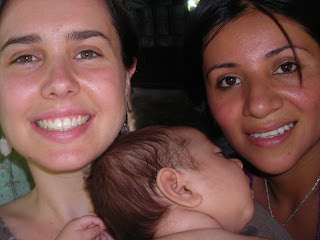I apologize for the delay (very sad, nearly a month) in making my last blog post. I started writing the blog below on the morning I left El Salvador a couple of weeks ago! I stayed up late writing it and was ready to post, when my internet connection failed! True story... It was nearly 5am at the time, so I opted for a few hours of sleep rather than anything else which might have rendered me insane. This comes to you relatively untouched since the time of its writing.
I hope to continue my blog since returning to Cleveland... another chapter and theme altogether! Though my posts might be sporadic, look for them from time to time. Your love and support this summer were very appreciated, much more than you may know.
Since I'm here, I might as well share what I will be up to now that I am home. I actually start my new job *tomorrow,* working with Knowledge College, Inc., a tutoring company offering tutoring services in Cleveland schools. My step-sister started the company a couple of years ago, and it's been doing great. First we're going to work on the "street team" recruiting kids to participate in the program, which should be neat. Spanish sounds like it will come in handy... then, tutoring starts in October! Our goal is to better prepare kids to take standardized tests come the Spring, and provide study skills and strategies for test-taking. A totally new venture for me, but one I'm looking forward to. I'm taking some classes in the evenings, as well -- biology and chemistry; yikes!! Wish me good luck, and much perseverance.
It has been good to come home, and just be here to reconnect with my family, enjoying the end of Cleveland summer. I've definitely had some days of feeling very lost, but I guess those too shall pass.
thanks for reading, and stay connected!
much peace to you all,
elizabeth
~*~*~*~*~*~*~*~*
This will be my last blog post from El Salvador. My flight leaves in just a few hours; so hard to believe. The summer has flown by, due mostly I think to the fact that I was really enjoying myself. I must admit that I've felt confused, and a little lost the past few days as I've been preparing to leave. I guess that is par for the course, though. I know without much of a doubt that it is time for me to return home (as in home home!) -- there is much waiting for me there -- and the mixed feelings of leaving are therefore welcomed. Whenever I go through transitions or hard discoveries, I always give myself (consciously) time to feel sad, or angry, or simply melancholy for a day or two. I actually say to myself, "This day is for you to feel sad about x, y or z." It helps so much! Of course the emotional residue can often linger much longer than that, but I've found it constructive to let myself simply be with hard feelings for a time before trying too hard to ward them off with other strategies. When children fall down, don't we give them time to cry? :)
It's not that note I want to end on, though. The reason I am anticipating these pending days of melancholy is because of how much joy I have experienced here over the last two months. After graduate school, it was needed. :) I feel like I've really reconnected with what is important to me -- namely community, God and being with people whose lives have been so different from my own. Through my time here this summer, I have watched a number of close relationships grow and change. That is very often a place that I find God, in relationship with others, in community. I feel like there has been a deepening of many of my friendships here, and that I really just want to be with people. As an introvert that is one of the last things I thought I would say, but it has come to be true. I still, of course, enjoy my alone time, but I've learned to enjoy myself much more in the company of others.
I think this may be just be beginning of my 'lessons learned'



